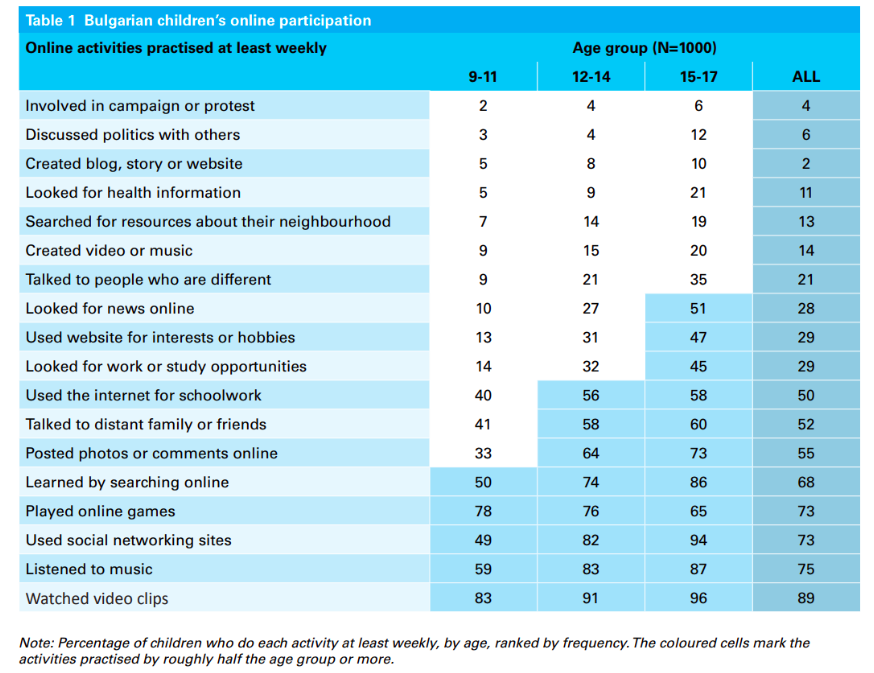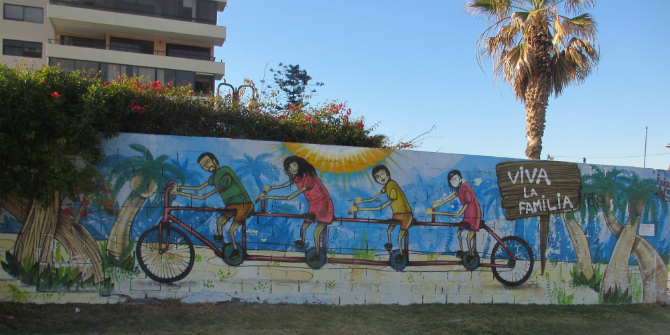 Findings on the online activities of children in Bulgaria, Chile and South Africa suggests a ‘ladder’ of online participation, write Sonia Livingstone and Daniel Kardefelt-Winther. Many children, especially younger ones, enjoy some of the fun and sociable opportunities that the internet provides, but do not climb the ‘ladder’ to reach the civic, informational and creative activities that are often heralded as crucial opportunities of the digital age. Sonia Livingstone is Professor of Social Psychology in the Department of Media and Communications at the London School of Economics and Political Science. Daniel Kardefelt-Winther works as Research Lead at UNICEF Office of Research where he coordinates a global project on Children’s Rights in the Digital Age. He tweets via @Winthernet. Header image credit: [G. Knight, CC BY 2.0]
Findings on the online activities of children in Bulgaria, Chile and South Africa suggests a ‘ladder’ of online participation, write Sonia Livingstone and Daniel Kardefelt-Winther. Many children, especially younger ones, enjoy some of the fun and sociable opportunities that the internet provides, but do not climb the ‘ladder’ to reach the civic, informational and creative activities that are often heralded as crucial opportunities of the digital age. Sonia Livingstone is Professor of Social Psychology in the Department of Media and Communications at the London School of Economics and Political Science. Daniel Kardefelt-Winther works as Research Lead at UNICEF Office of Research where he coordinates a global project on Children’s Rights in the Digital Age. He tweets via @Winthernet. Header image credit: [G. Knight, CC BY 2.0]
Internet access is important for children and can provide them with many opportunities. Yet pressing questions remain about what society hopes children will or should do online or whether online opportunities result in real benefits. Is there a gap between expectations and reality? If so, what should be done? To answer these questions, a new report compared findings from three very different Global Kids Online countries – Bulgaria, Chile and South Africa.
Intriguingly, the overall rank ordering of children’s online activities is fairly similar in each country. This suggests a common ‘ladder’ of children’s online participation with several steps. See the Bulgarian results below, as an example:
- The first step reveals the entry-level activities for young children, and they remain the most popular activities across the age range. With the emphasis on social and entertainment activities, these include visiting social networking sites, online gaming and watching video clips. These attractive and accessible activities seem to encourage early internet use and, a possible benefit, they may build children’s initial skills so that they can climb further up the ladder.
- Learning activities are sometimes included in the first step on the ladder though in Bulgaria using the internet for schoolwork comes only children deepen their online engagement. This may be because in Bulgaria children go online at home before they use the internet in school and because they are not taught digital skills systematically in the classroom. Chile has long-standing policy support for ICT in Education, which might explain why more Chilean children use the internet for schoolwork compared to children in Bulgaria or South Africa.
- The findings show that while most children in the three countries are already enjoying some online opportunities in sizeable proportions, most children do not reach the point where they commonly undertake many of the civic, informational and creative activities online that are heralded as the opportunities of the digital age.
- The country comparisons suggest that children travel somewhat different pathways to online opportunities, influenced by their life context and skills. South African children enjoy a greater breadth of opportunities than children in other countries by the time they reach 15 to 17 years, but the opportunities accessed by the youngest children are limited. This may be the result of the challenges that some South African children face in accessing affordable and fast internet.
- For Bulgarian children the gap between younger and older children is less stark, but worth thinking about: what does society expect and hope for children’s internet use, especially for younger children? How much is of value?
- At the top of the ladder, it is notable that very few Bulgarian and Chilean children engage in civic activities online, while this is somewhat more common in South Africa. It is worth considering why this is the case and whether the education system and/or specific policy or programme interventions can make a difference.
Of course, many factors influence how high children may ‘climb’ the ladder of online participation, and there are different opinions about whether some online activities are more desirable than others. While some online activities are already popular amongst most children, governments and policy makers can potentially enable children to benefit more from the internet by providing learning and civic opportunities within the formal education system that can compensate for inequalities at home. Note, however, that the entry-level activities that encourage children and perhaps build their digital skills tend to be entertaining and sociable in nature.
Existing differences amongst the countries suggest that there is scope to design children’s pathways to online participation in different ways. This requires additional analysis of why children engage in various activities online and the extent to which different activities are associated with benefits or harms. The Global Kids Online network will focus on these questions – and more – in an upcoming synthesis report for 2019, concentrating on children’s digital skills development.
Access the briefing paper with detailed findings.
Notes
Original publication: Livingstone, Sonia; Kardefelt-Winther, Daniel; Kanchev, Petar; Cabello, Patricio; Claro, Magdalena; Burton, Patrick; Phyfer, Joanne (2019). Is there a ladder of children’s online participation? Findings from three Global Kids Online countries, Innocenti Research Briefs no. 2019-02, UNICEF Office of Research – Innocenti, Florence.
This text was originally published on the Global Kids Online Blog and has been re-posted here with permission.
This post gives the views of the authors and does not represent the position of the LSE Parenting for a Digital Future blog, nor of the London School of Economics and Political Science.






